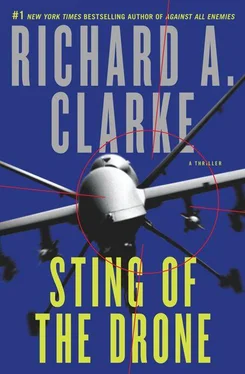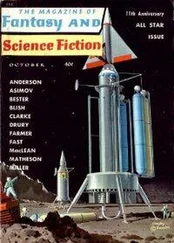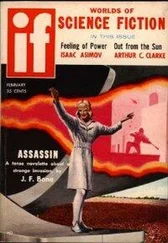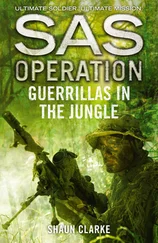Ghazi laughed and turned to face Bahadur. “There are no Arabs, no Pushtuns, no prisoners at all. It’s empty. It is for tourists.” Bahadur frowned. “You see, Ahmed, you do not really understand these people. I do because, yes, I live in Canada, I live among them.
“But I also have a blood debt because of my father. And therefore I will help Qazzani kill them. And you and your boys will kill them. But killing them will not stop the drones. They will only send more. The only way to stop them is to use their media, their laws, their politicians. That way we make their own people stop the drones and decide to really leave Afghanistan. We make it their choice.”
Bahadur shook his head. “I trust you because Qazzani trusts you, but you are not one of us anymore. You look like you belong here, you act like you belong here, you even sound like you are from here. But we must work together. We need to have our attacks happen at the same time. My bombs go off in the old subways. Your computer guys cause crashes in the new metros. We destroy their Christmas. Here, take my plans and the timing. Don’t worry, it’s on one of your special sticks. They will erase when you read them.”
The man in the suit thrust out his hand as if to shake, but with the thumb drive in his palm. The two men shook hands without speaking and then Bahadur climbed down from the upper deck. Alone, looking out at the bridge, Ghazi fingered the thumb drive he had just put in his pants pocket.
He knew the attacks on the subways would infuriate the Americans again, just when they were getting used to the idea that they were invulnerable to any more terrorist attacks in their homeland. His attacks on their drone program would also make them know they were not invulnerable. But would it make them leave Muslim lands, would it make them stop the drones? Would even the political pressure from within America be enough to stop the drones? He wasn’t sure.
And if it didn’t work, should he continue? Or should he take his inheritance from his father and the matching money from Qazzani and just disappear, maybe to Brazil, South Africa, or New Zealand? It was a lot of money. He could live well. But he would always be looking over his shoulder and they would always be looking for him. Somehow they would find him, someday. They had taken forever to find Osama, but they finally did. And while Osama was waiting for them, he lived a horrid life, cooped up in that wretched house. I cannot live like that, Ghazi thought, waiting for them to come for me.
He had tried to be not just a Canadian, but a Global. It had worked, up to a point. He knew his way around in cities on every continent, where to get the best meal, the best wine, the best woman. Even without his father’s money, he had stashed millions from the cyber crime in safe-deposit boxes all over the world. But no place was home, no cuisine, no traditions were his. He had never known a real emotion that drove him, until now. And that emotion did not have its roots in Vancouver, or Chelsea, or Saint-Tropez, or Hong Kong. It came from the Pushtun homeland and it was blood. It was not about Allah, or some myth about virgins waiting in an afterlife. No, it was about tribal duty, family duty. It was about vengeance.
So this, he knew now, was his fate. A short, but exciting life. Choice had been an illusion after all. There was no future, not for him, not now, just duty. This was going to be it, the vengeance, the statement, the accomplishment that would go down in history like 9/11, like 7/7 in London.
The boat shook as it docked in Sausalito, breaking his thoughts. He moved quickly to get off the boat. There was something he needed to buy in Marin.
TUESDAY, DECEMBER 8
GILGIT AIRPORT
GILGIT, PAKISTAN
“Zebra Roger Papa, requesting permission to take off.”
“AP-ZRP, you are clear to take off,” the man in the tower said. The aircraft had a civilian call sign, its tail number. The aircraft was painted white with blue trim. There was no logo, no livery.
It was the only aircraft at the field. Pakistan Airlines flew in twice a day, weather permitting, but for twenty-two hours a day Gilgit was usually an airport without aircraft. Gilgit was a small mountain town near Pakistan’s border with China. It had been spared the presence of the Taliban and al Qaeda. It had been spared, therefore, the drones. For the last two weeks the unmarked, high wing, twin-engine aircraft had sat inside the old military hangar at Gilgit’s little airport, out of sight.
“Roger, Gilgit Tower, ZRP rolling,” the pilot said as the Chinese-made Y-11 began the full-powered run down the airstrip. He had flown the Y-11 when he was in the Pakistan Air Force. Now, he and the guys in the back of the plane were making more money in a month than they had made in a year in the military. Someone always wanted an unscheduled, off-the-books flight, with no questions about the cargo.
In the high, thin air of the Hindu Kush the twin-propellered aircraft would need every inch of the runway to lift off into the valley. The cargo, however, was light. Almost everything had been removed from the cabin, except for a table with computers and black boxes, and two men who sat watching them.
The aircraft banked and headed southwest, passing under the monstrous peak of Nanga Parbat. The pilot had the aircraft pointed toward the Swat Valley, an area of beauty once called the Switzerland of South Asia. For over a decade its resorts had seen few foreign tourists. Its morgue, however, had seen many victims of the fighting, some killed by the drones. Today, it was the drone that was being hunted.
In a short time, a drone was expected over the Swat Valley. The Pakistani ISI had passed word to the Americans, word that one of the few remaining leaders of al Qaeda Central was going to a meeting near the base of Tirch Mir, the 7,700-meter peak outside of Chitral. The Americans would likely come to look, perhaps to kill.
The men in the back watched their computers as the radios that had been added to the aircraft scanned the frequencies used by the drones. Other radios were standing by, not to receive, but to broadcast through the new antenna blister that had been added under the tail of the Y-11. One radio would overpower the satellite signal on which the drone’s pilot was sending his commands to the aircraft. Another radio would send a loud noise onto the frequency the Americans used to transmit their encrypted GPS signal to their military receivers. Finally, a third radio would send a loud signal on the same frequency that was used for civilian navigation data, a false GPS signal. The result would be that the drone, unable to phone home, would fly home, or where it thought home was, based on the false GPS data. It would land at Mardan. There would be people there to meet it.
First, however, the Y-11 pilot needed to find the drone and fly his aircraft just a little higher, maybe at fifteen thousand feet, and just a little bit abeam, maybe one thousand meters. He had been told that the Americans could change the color of their drones to blend into the sky, but they could not do that on the top of the wings, just on the bottom. So, while you could not easily see the drone from below, from above it would stand out. He wished that his friends in the Pakistani Air Force, his former colleagues, could radio him when they saw the drone on their radar, but he knew they could not. The Americans were always listening, listening to everything. So he, and his copilot, scanned the sky below them as they approached the Swat Valley.
TUESDAY, DECEMBER 8
GLOBAL COORDINATION CENTER
CREECH AFB, NEVADA
“It was a gas leak. That little park, that lot next to his house, it had a big gas pipeline and a pump underground. That’s why there was no house on the lot. The Wongs didn’t know that. We all wondered who paid for the landscaping on that empty lot. But it was a gas leak, I asked the Clark County Sheriff’s office. They’re not treating it as a homicide. They say the pipe corroded,” Erik Parsons told Sandra Vittonelli in her office.
Читать дальше












